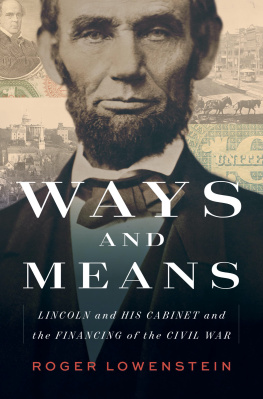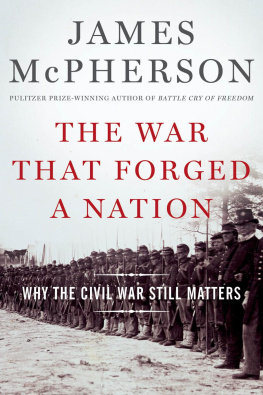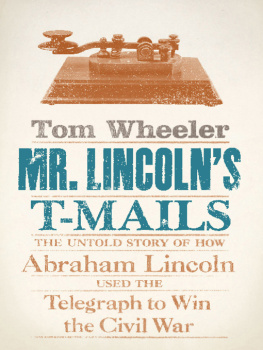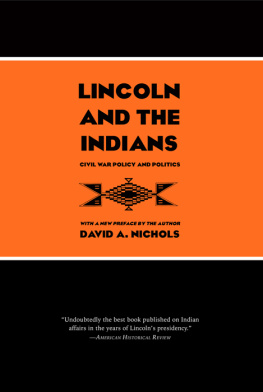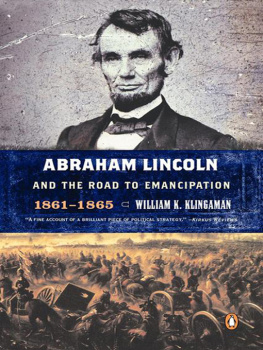Lowenstein Roger - Ways and Means : Lincoln and His Cabinet and the Financing of the Civil War
Here you can read online Lowenstein Roger - Ways and Means : Lincoln and His Cabinet and the Financing of the Civil War full text of the book (entire story) in english for free. Download pdf and epub, get meaning, cover and reviews about this ebook. year: 2022, publisher: Penguin Publishing Group, genre: History. Description of the work, (preface) as well as reviews are available. Best literature library LitArk.com created for fans of good reading and offers a wide selection of genres:
Romance novel
Science fiction
Adventure
Detective
Science
History
Home and family
Prose
Art
Politics
Computer
Non-fiction
Religion
Business
Children
Humor
Choose a favorite category and find really read worthwhile books. Enjoy immersion in the world of imagination, feel the emotions of the characters or learn something new for yourself, make an fascinating discovery.
- Book:Ways and Means : Lincoln and His Cabinet and the Financing of the Civil War
- Author:
- Publisher:Penguin Publishing Group
- Genre:
- Year:2022
- Rating:4 / 5
- Favourites:Add to favourites
- Your mark:
- 80
- 1
- 2
- 3
- 4
- 5
Ways and Means : Lincoln and His Cabinet and the Financing of the Civil War: summary, description and annotation
We offer to read an annotation, description, summary or preface (depends on what the author of the book "Ways and Means : Lincoln and His Cabinet and the Financing of the Civil War" wrote himself). If you haven't found the necessary information about the book — write in the comments, we will try to find it.
Lowenstein Roger: author's other books
Who wrote Ways and Means : Lincoln and His Cabinet and the Financing of the Civil War? Find out the surname, the name of the author of the book and a list of all author's works by series.
Ways and Means : Lincoln and His Cabinet and the Financing of the Civil War — read online for free the complete book (whole text) full work
Below is the text of the book, divided by pages. System saving the place of the last page read, allows you to conveniently read the book "Ways and Means : Lincoln and His Cabinet and the Financing of the Civil War" online for free, without having to search again every time where you left off. Put a bookmark, and you can go to the page where you finished reading at any time.
Font size:
Interval:
Bookmark:
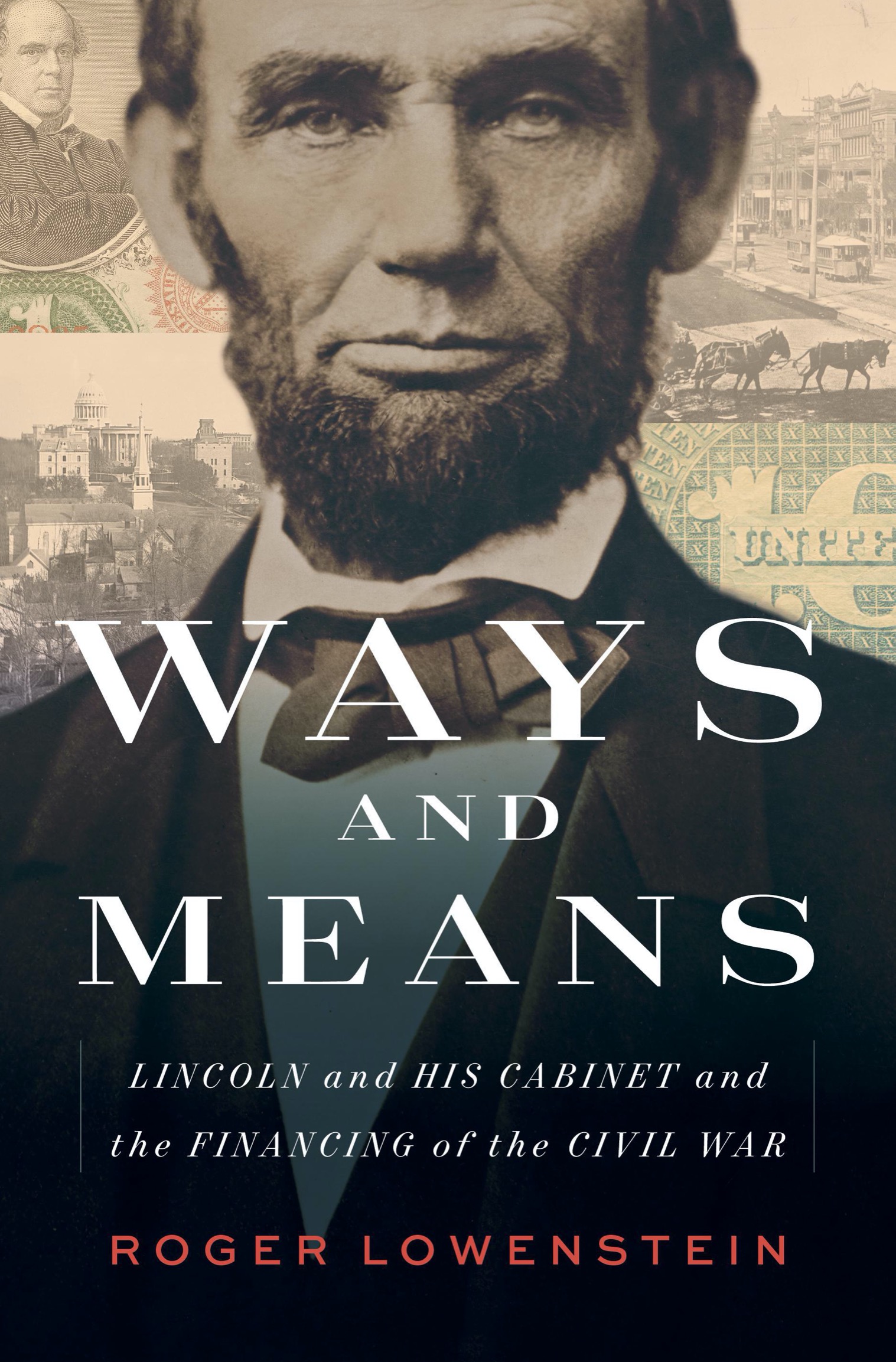
Americas Bank: The Epic Struggle to Create the Federal Reserve
The End of Wall Street
While America Aged: How Pension Debts Ruined General Motors, Stopped the NYC Subways, Bankrupted San Diego, and Loom as the Next Financial Crisis
Origins of the Crash: The Great Bubble and Its Undoing
When Genius Failed: The Rise and Fall of Long-Term Capital Management
Buffett: The Making of an American Capitalist
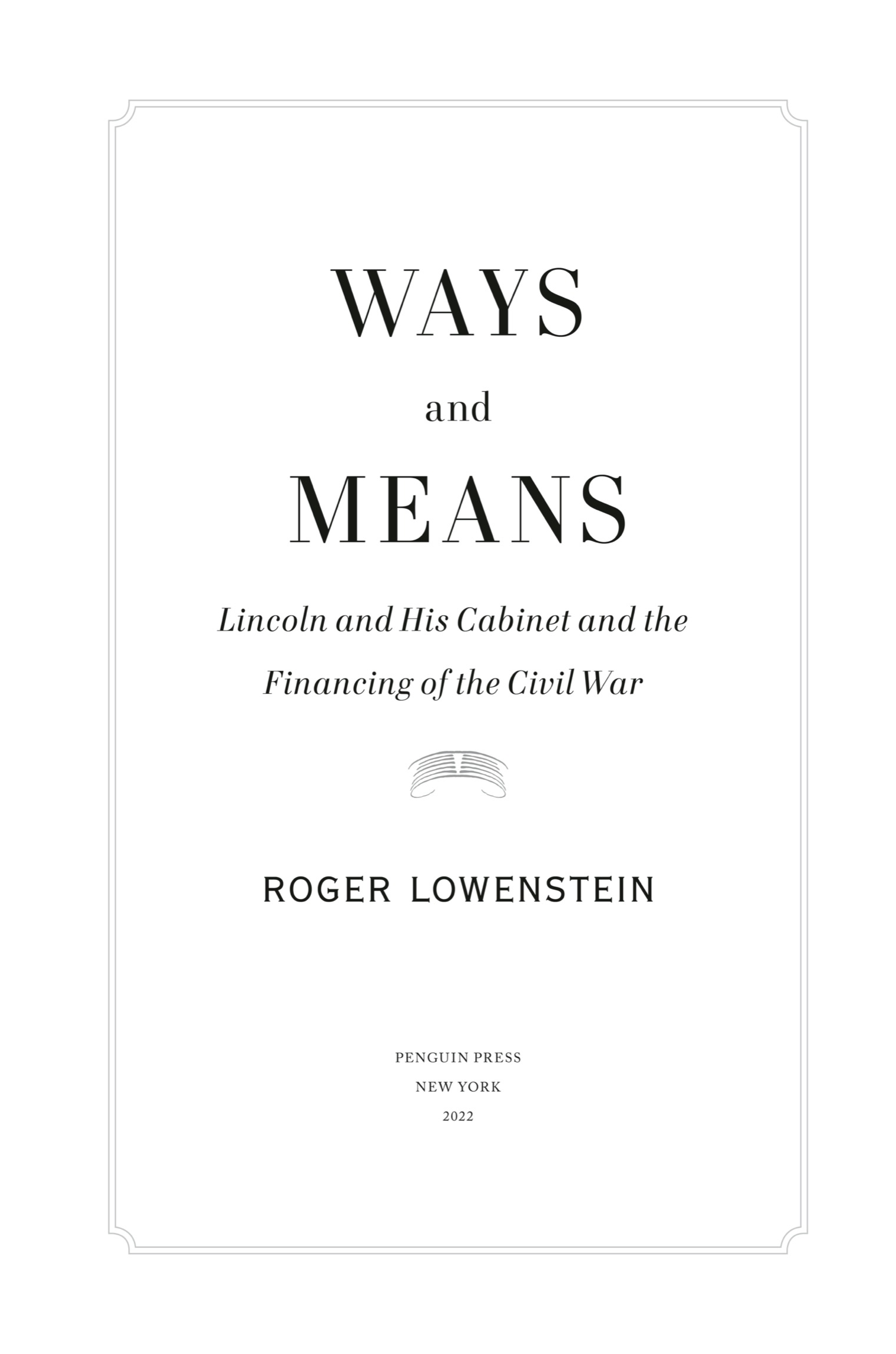
PENGUIN PRESS
An imprint of Penguin Random House LLC
penguinrandomhouse.com
Copyright 2022 by Roger Lowenstein
Penguin supports copyright. Copyright fuels creativity, encourages diverse voices, promotes free speech, and creates a vibrant culture. Thank you for buying an authorized edition of this book and for complying with copyright laws by not reproducing, scanning, or distributing any part of it in any form without permission. You are supporting writers and allowing Penguin to continue to publish books for every reader.
Illustration credits appear on .
library of congress cataloging-in-publication data
Names: Lowenstein, Roger, author.
Title: Ways and means : Lincoln and his cabinet and the financing of the
Civil War / Roger Lowenstein.
Description: First edition. New York : Penguin Press, 2022. | Includes bibliographical references and index.
Identifiers: LCCN 2021029398 (print) | LCCN 2021029399 (ebook) | ISBN 9780735223554 (hardcover) | ISBN 9780735223561 (ebook)
Subjects: LCSH: Lincoln, Abraham, 18091865. | United StatesHistoryCivil War, 18611865Economic aspects. | United StatesHistoryCivil War, 18611865Finance. | United StatesPolitics and government18611865. | United StatesEconomic conditionsTo 1865. | United StatesHistory18491877.
Classification: LCC HC105.6 .L69 2022 (print) | LCC HC105.6 (ebook) | DDC 973.7/1dc23
LC record available at https://lccn.loc.gov/2021029398
LC ebook record available at https://lccn.loc.gov/2021029399
Cover design: Evan Gaffney
Cover images: (center) Portrait of Lincoln by Alexander Gardner. Retrieved from the Library of Congress (scsm0000793); (top left and bottom right) $1 and $10 legal tender notes greenback issue, National Numismatic Collection, National Museum of American History; (bottom, left) view of Wisconsin State Capitol, by Andreas Larsen Dahl / Wisconsin Historical Society / Getty Images; (top, right) New Orleans, c. 1870, Hulton Archive / Getty Images
Designed by Amanda Dewey, adapted for ebook by Shayan Saalabi
pid_prh_6.0_139379515_c0_r0
To Judy
The Revolution did not create a nation.
 Robert Penn Warren
Robert Penn Warren

Greenback Plunges and Recovers
Value of $100 Greenback in Gold
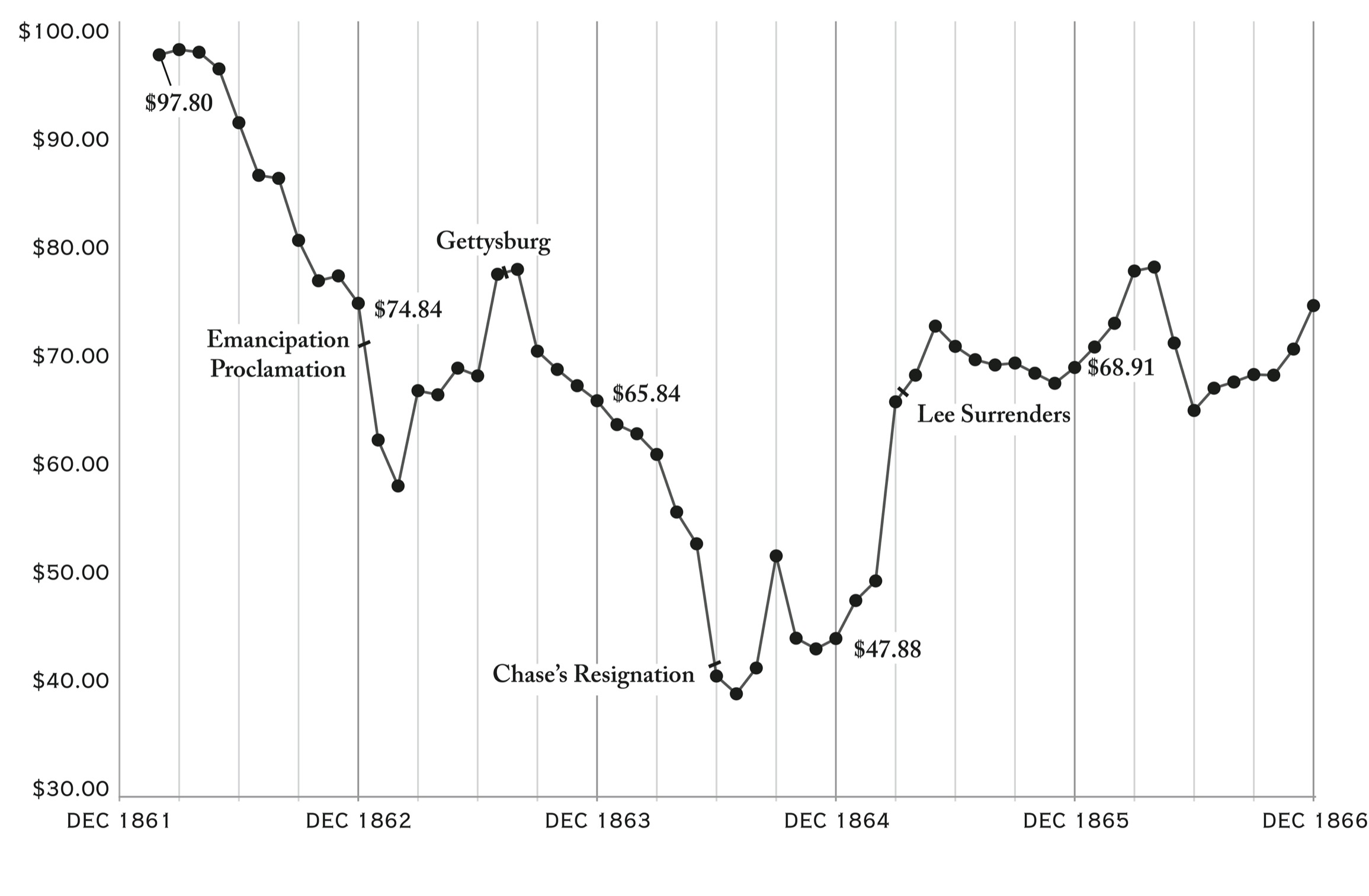
Source: Economic History Association
Hyperinflation in Dixie
Value of $1 in Gold in Confederate Notes
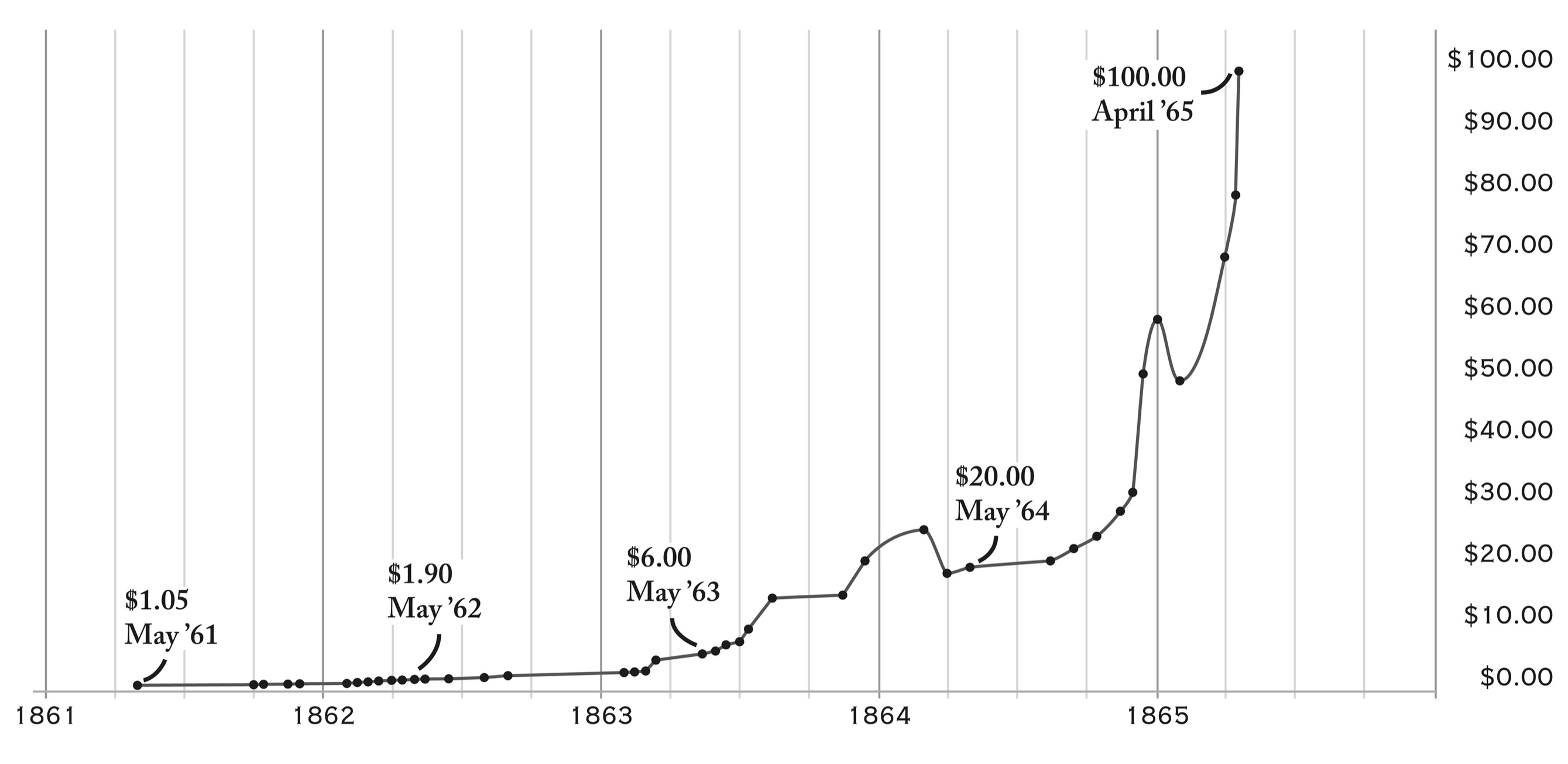
Source: Richmond Civil War Centennial Committee via InflationData.com
On Christmas Eve 1825 , Thomas Jefferson let loose an anguished cry. The government of the country he had helped to found, half a century earlier, was causing him great distress. It was assuming vast powers, specifically the right to construct canals and roads, and to effect other improvements. Jefferson thought of the federal government in the most restrictive terms: as a compact or a confederated fabricthat is, a loose affiliation of practically sovereign states. He was roused at the age of eighty-two to issue a Solemn Declaration and Protest against what he termed the usurpation of power by the federal branch. Jefferson was so agitated that he declared that the rupture of the United States would be, although a calamity, not the greatest calamity. Even worse, reckoned the sage of Monticello, would be submission to a government of unlimited powers.
This ideological debate had been raging since the Revolution itself. Federalists led by Alexander Hamilton had sought to establish a strong central government to marshal the countrys finances and develop its infrastructure and commercial potential. Jeffersonians adamantly objected.
And by and large, Jefferson won. No fewer than six of his successors vetoed or thwarted federal legislation to build roads and canals, improve harbors and riverways, maintain a national bank, fund education, and even care for the indigent mentally ill. In 1860, just before the election of Abraham Lincoln, the latest of these, James Buchanan, struck down a project to deepen a water channel in Michigan and vetoed a bill for federal homesteads.
Had Jefferson survived until 1860, the federal government of the day would not have displeased him. Its main vocation was operating the postal service and collecting customs duties at the ports. Its army consisted of a mere sixteen thousand troops scattered mostly among a series of isolated forts west of the Mississippi River. Those functions aside, the states were essentially on their own. The federal payroll was modest in the extreme. The civilian bureaucracy in Washington consisted of a mere two thousand employees. Its administrative scaffolding was threadbare, its financial capabilities primitive.
The modest federal purse was supported by tariff duties and a smattering of land sales. Federal taxes (an unpleasant reminder of the English Parliament) were reflexively scorned.
Then came the rupture.
The Republicanselected on the eve of the Civil Warvastly enlarged the government, not only to defeat the Confederacy but to carry out an agenda for industry and growth, and to foster opportunity, especially for those at the bottom. They accomplished a revolution that has been largely overlooked.
Though their purposes stretched well beyond those of the Founders, Lincoln and the Republicans did not think of themselves as countering the original American revolution. More nearly, they were completing it. These Republicans revered the FoundersJefferson includedbut they scarcely resembled them. They owned no plantations nor slaves, had not been born to wealth, generally had not traveled to England or France. For the most part, the Republican leaders were self-made men, many forged in a crucible of hard experience. John Sherman, a leading congressman, was the son of a lawyer who had died when John was six, leaving his mother to raise eleven children in poverty. Salmon Chase, the Treasury secretary, on whom fell the Bunyonesque burden of raising more money than had been expended in total since the beginning of the Republic, had been plagued by hardship and personal losses. Horace Greeley was born to poor farmers in New Hampshire.
Prototypical was Thaddeus Stevens, born with a clubfoot in a remote hamlet in Vermont to a cobbler father who abandoned him. Confronted with prejudice as well as poverty, Thaddeus developed a protective shield of sarcasm, enrolled in Dartmouth, and established himself in Pennsylvania, where he practiced law and operated an iron foundry. Stevens typified both sides of the Republican rags-to-riches ethossupport for the common classes combined with mercantile ambition. Early in his career, he distinguished himself by fighting for free public schools, which Pennsylvania established before any other state. During the legislative fracas, Stevens mocked opponents of public education with the derisive barb that it was easier to pass a bill to improve the breed of hogs than that of men. In Congress he became the scourge of the South, the bitter enemy of the slave masters.
Font size:
Interval:
Bookmark:
Similar books «Ways and Means : Lincoln and His Cabinet and the Financing of the Civil War»
Look at similar books to Ways and Means : Lincoln and His Cabinet and the Financing of the Civil War. We have selected literature similar in name and meaning in the hope of providing readers with more options to find new, interesting, not yet read works.
Discussion, reviews of the book Ways and Means : Lincoln and His Cabinet and the Financing of the Civil War and just readers' own opinions. Leave your comments, write what you think about the work, its meaning or the main characters. Specify what exactly you liked and what you didn't like, and why you think so.

